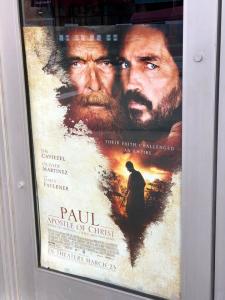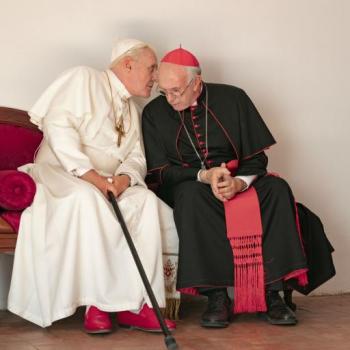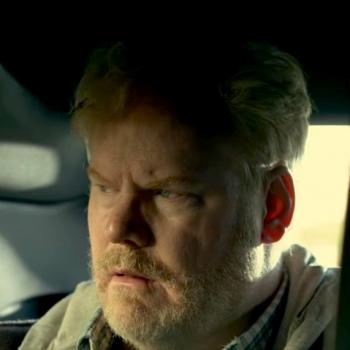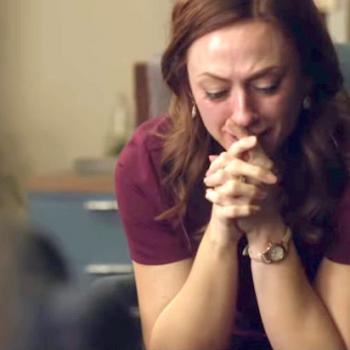My wife and I spent Easter Monday evening with St. Paul in a Roman prison.
It was a much better experience than I expected.
The occasion, of course, was the movie “Paul, Apostle of Christ,” and there’s a lot about the movie I liked. Here are five quick impressions:
1. It is very much a movie for our time. The film concludes with a dedication to persecuted Christians—and, indeed, persecution is an insistent theme. While the story focuses on an imprisoned Paul (an excellent James Faulkner) — and an extended visit from Luke (a stoic Jim Caviezel) to record his story for what would become “Acts of the Apostles”— the beating heart of the film is really the small but spirited community of persecuted Christians led by Priscilla and Aquila. Unfortunately, while we see their anguish and suffering, we don’t really see much of their lived faith; there is talk of ongoing efforts to help widows and orphans, but it’s unclear how they do that when they are more or less in hiding. Likewise, we never see them at prayer or celebrating the liturgy. (Also missing, for some reason, is any mention of Peter.) But their fervor is palpable, and when we watch them debate whether they should stay in Rome or flee someplace else for safety, we hear unmistakable echoes of suffering Christians in our own time, wrestling with the same question in modern day Iraq and Syria. The movie could not be more timely.
2. We get an idea about what comprised Paul’s “thorn in the flesh.” I found that notion incredibly poignant.
 3. We stand on the shoulders of martyrs. I was moved to see the stoning of Stephen depicted—and to see hints that there may have been many others whom Saul played a role in killing. The movie has flashes of violence, but it is not nearly as graphic as “The Passion of the Christ”; the gore is minimal and mostly suggested. Christians being turned into human torches on the streets of Rome is probably something that hasn’t been filmed before, but you will see it, briefly, here. Again and again, I was reminded of the incredible courage and sacrifice that infused the faith of our fathers (and mothers!). The final scene (which I won’t give away here) moved me deeply. We do indeed stand on the shoulders of martyrs—and they are giants.
3. We stand on the shoulders of martyrs. I was moved to see the stoning of Stephen depicted—and to see hints that there may have been many others whom Saul played a role in killing. The movie has flashes of violence, but it is not nearly as graphic as “The Passion of the Christ”; the gore is minimal and mostly suggested. Christians being turned into human torches on the streets of Rome is probably something that hasn’t been filmed before, but you will see it, briefly, here. Again and again, I was reminded of the incredible courage and sacrifice that infused the faith of our fathers (and mothers!). The final scene (which I won’t give away here) moved me deeply. We do indeed stand on the shoulders of martyrs—and they are giants.
4. The Church, from the evidence in the movie, has always been fractious and fractured. The underground Church depicted in the movie is full of people who faithfully attempt to live the Gospel with love and charity and patience —and those who want to Go Rogue and slaughter every Roman in sight. Some of the disagreements nearly sparked a riot. I couldn’t help but think: the waving fists and shouting voices among Catholics on Facebook these days belong to a long and not very noble tradition.
5. You understand more and more why Jesus kept telling his disciples, “Do not be afraid.” Christianity could never have endured if it had been spread by cowards. These men and women not only had the courage of their convictions, but the courage to sacrifice everything, even their lives, if God willed it. Their firm belief in eternal life, and the reward that awaited them — described by Luke, speaking to a number of Christians as they prepared to face certain death in the Coliseum — is humbling and sobering. How many of us today have even one-tenth that kind of faith, let alone that kind of courage?
For all its power, the movie has some nagging problems; after a riveting beginning, it bogs down into talkiness, and the flashbacks clearly indicate that the most interesting parts of Paul’s life happened long before he was in jail. The prison setting is confining, in more ways than one. More problematic is a subplot involving a prison guard (Olivier Martinez) with a sickly daughter, and a denouement you can anticipate long before it finally happens. The movie could have lost 15 or 20 minutes without any problem.
But “Paul, Apostle of Christ” is a worthy companion piece to two other films about the early Church, “Risen” and “Full of Grace” (the latter, from the same producers and the same director, Andrew Hyatt). See it. Support it. Think about what it says about where we came from, where we are, and how we got here.
As Paul would be the first to tell you: across two millennia, we Christians have run an amazing race—fueled, of course, by amazing grace.












